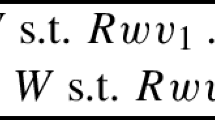Abstract
We establish completeness and the finite model property for logics featuring the pooling modalities that were introduced in Van De Putte and Klein (Pooling modalities and pointwise intersection: semantics, expressivity, and applications). The definition of our canonical models combines standard techniques with a so-called “puzzle piece construction”, which we first illustrate informally. After that, we apply it to the weakest classical logics with pooling modalities and investigate the technique’s potential for the axiomatization of stronger logics, obtained by imposing well-known frame conditions on the models.
Article PDF
Similar content being viewed by others
Avoid common mistakes on your manuscript.
References
Baltag, A., N. Bezhanishvili, A. Özgün, and S. Smets, Justified belief and the topology of evidence, in J. Väänänen, Å. Hirvonen, and R. de Queiroz, (eds.), Logic, Language, Information, and Computation, Springer, Berlin, 2016, pp. 83–103.
Blackburn, P., M. De Rijke, and Y. Venema. Modal Logic, Cambridge Tracts in Theoretical Computer Science, 2001.
Chellas, B., Modal Logic: An Introduction, Cambridge university press, Cambridge, 1980.
Lewis, D., Intensional logics without iterative axioms, Journal of Philosophical Logic 3(4): 457–466, 1974.
Pacuit, E., Neighbourhood Semantics for Modal Logic. Springer, 2017.
Urquhart, A., Decidability and the finite model property, Journal of Philosophical Logic 10(3): 367–370, 1981.
van Benthem, J., and E. Pacuit, Dynamic logics of evidence-based beliefs, Studia Logica 99(1): 61, 2011.
Van De Putte, F., and D. Klein, Pooling modalities and pointwise intersection: Semantics, expressivity, and applications. Unpublished manuscript, under review. Available for download at https://www.clps.ugent.be/sites/default/files/publications/Pooling%20Modalities%20Part%20I%20Semantics.pdf.
Van De Putte, F., and D. Klein, Pointwise intersection in neighbourhood modal logic, in G. Bezhanishvili and G. D’Agostino, (eds.), Advances in Modal Logic (AiML 12), College Publications, 2018, pp. 591–610.
Acknowledgements
Open Access funding provided by Projekt DEAL. We are indebted to Eric Pacuit and Fengkui Ju for insightful discussions on the completeness proofs. We are also indebted to two anonymous referees for their incisive comments on an earlier version. Frederik Van De Putte’s work on this paper was supported by the European Comission through a Marie Skłodowska-Curie Fellowship (Grant Agreement ID: 795329) and by the Flemish Research Foundation (FWO-Vlaanderen). The work of Dominik Klein was partially supported by the Deutsche Forschungsgemeinschaft (DFG) and Agence Nationale de la Recherche (ANR) as part of the joint project Collective Attitude Formation [RO 4548/8-1], by DFG and Grantová Agentura České Republiky (GAČR) through the joint project From Shared Evidence to Group Attitudes [RO 4548/6-1] and by the National Science Foundation of China as part of the project Logics of Information Flow in Social Networks [17ZDA026].
Author information
Authors and Affiliations
Corresponding author
Additional information
Publisher's Note
Springer Nature remains neutral with regard to jurisdictional claims in published maps and institutional affiliations.
Rights and permissions
Open Access This article is licensed under a Creative Commons Attribution 4.0 International License, which permits use, sharing, adaptation, distribution and reproduction in any medium or format, as long as you give appropriate credit to the original author(s) and the source, provide a link to the Creative Commons licence, and indicate if changes were made. The images or other third party material in this article are included in the article’s Creative Commons licence, unless indicated otherwise in a credit line to the material. If material is not included in the article’s Creative Commons licence and your intended use is not permitted by statutory regulation or exceeds the permitted use, you will need to obtain permission directly from the copyright holder. To view a copy of this licence, visit http://creativecommons.org/licenses/by/4.0/.
About this article
Cite this article
Van De Putte, F., Klein, D. Pooling Modalities and Pointwise Intersection: Axiomatization and Decidability. Stud Logica 109, 47–93 (2021). https://doi.org/10.1007/s11225-020-09901-6
Received:
Published:
Issue Date:
DOI: https://doi.org/10.1007/s11225-020-09901-6



